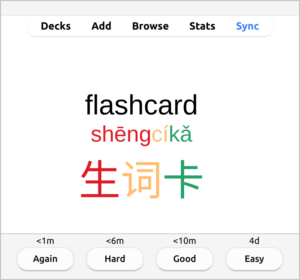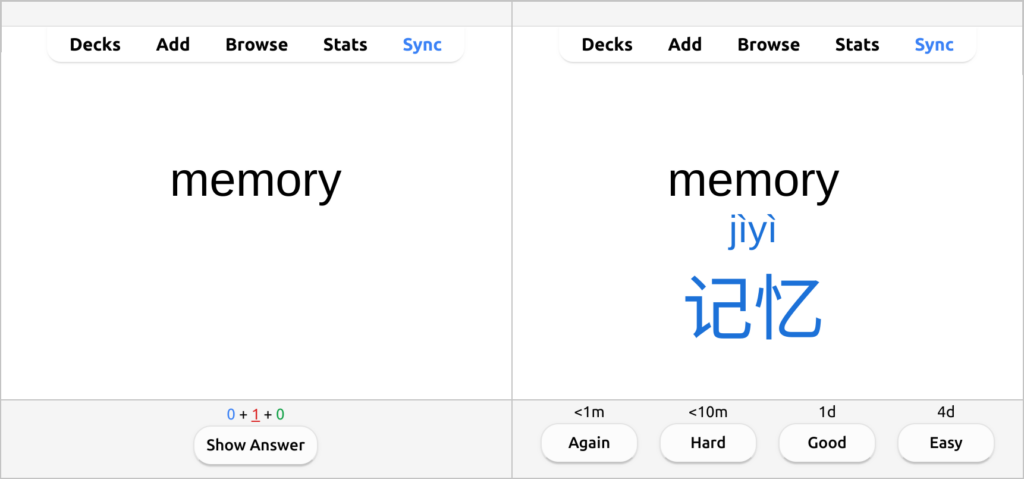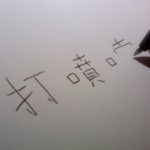 The humble flashcard: A key component in a successful strategy, or a distraction from what truly matters? Few things have sparked as much debate as the use of flashcards for learning a foreign language.
The humble flashcard: A key component in a successful strategy, or a distraction from what truly matters? Few things have sparked as much debate as the use of flashcards for learning a foreign language.
In this and two follow-up articles, I will discuss the role of flashcards in learning Chinese. As we shall see, this is a complex topic with many potential pros and cons depending both on how you use flashcards and what you use them for.
Tune in to the Hacking Chinese Podcast to listen to the related episode:
Available on Apple Podcasts, Google Podcast, Overcast, Spotify, YouTube and many other platforms!
In this first article, we will focus on the upsides of using flashcards, then we will flip the coin and look at the downsides. In the final part, we will try to balance the pros and cons and see what role, if any, flashcards should have in your approach to learning Chinese. Here are all the articles in this series:
- Why flashcards are great for learning Chinese (this article)
- Why flashcards are terrible for learning Chinese
- How to best use flashcards to learn Chinese
When I discovered the power of flashcards for learning Chinese
I remember clearly what it was like to start using flashcards to learn Chinese. It was almost like magic; I was suddenly able to memorise all the vocabulary I encountered and decided to learn.
Flashcards allowed me to nail smaller tests and bigger exams alike, and succeed in my courses while spending less time on characters and words than I had before. For handwriting specifically, I also found it much more enjoyable than the mindless repetition I had been doing prior to that.
Flashcards also made me feel more in control of my vocabulary learning, choosing what vocabulary to learn and being reasonably sure that I would remember it later. The feeling of forgetting most of what I learnt went away.
Why do flashcards work so well for memorising vocabulary in Chinese?
Flashcards aren’t magic, though, but are instead underpinned by thoroughly researched principles related to how we learn and remember
There are mainly two things that make flashcards excellent for remembering certain types of information:
- The spacing effect is a psychological phenomenon that has been observed across a wide range of learning domains, from language learning to sports. In essence, spreading repetitions over time leads to better long-term results compared with massing repetition together. In other words, it’s better to review a word ten times in ten days, rather than reviewing it ten times in one day. Learning methods and software based on this effect are usually called “space repetition”.
- Active recall is when you actively search your memory for the information you’re looking for. If I ask you to write the Chinese word for “memory”, jìyì, and you are able to write 记忆/記憶, this is an example of active recall. If I gave you a Chinese sentence containing that word and asked you to read it, you would also think about those characters, but you wouldn’t need to actively recall how to write them by hand. A very clear result of memory research is that simply seeing or hearing something leads to worse retention than actively recalling it.
These are the key reasons why flashcards work. While it’s possible to imagine flashcards without spaced repetition (such as if you reviewed the same flashcard over and over) or without active recall (such as if you included the answer on the front of the card), I would argue that this is not how people normally use flashcards.
What is a flashcard anyway?
Before we move on to more benefits of using flashcards for learning Chinese, let’s discuss what a flashcard is. A traditional flashcard is a piece of paper with a question (usually called a prompt) on the front and an answer on the back. You look at the front, try to recall the information on the back, and then flip it over to verify if you were right or wrong.
In theory, you can put anything on the front and anything on the back. Digital flashcards don’t need to have only two sides either and also allow for having pictures, audio and even video on them.

You can have prompts with only one word on them (such as “memory”, and you’re supposed to write 记忆/記憶) or prompts that take minutes to go through (a long paragraph with one word blanked out). Similarly, you can have answers that are very simple (such as the two characters for “memory”) or answers that are very complex and contain full dictionary entries and personal notes for the vocabulary item in question.
With some ingenuity, you can create a flashcard for almost anything you want to remember. This means that it’s hard to discuss flashcards in general because the pros and cons depend on exactly how you use them.
Here, however, I will mostly discuss flashcards as they are commonly used to learn languages. This means short prompts and short answers, sometimes with pictures and/or audio.
More benefits of using flashcards for learning Chinese
I have already explained why flashcards work when it comes to memorising basic information of the kind that can be easily put on the front and back of flashcards. There are many other benefits, however, which aren’t exclusive to flashcards, but which are still important reasons to use them:
-
 An efficient way to learn the basic meaning of characters and words – As I’ve already said above, flashcards are very efficient, meaning that you can review exactly what you need to review quickly. If you’re busy with other things and only have 10-15 minutes, it’s hard to imagine an activity that would give you more bang for your buck than reviewing flashcards that have come due.
An efficient way to learn the basic meaning of characters and words – As I’ve already said above, flashcards are very efficient, meaning that you can review exactly what you need to review quickly. If you’re busy with other things and only have 10-15 minutes, it’s hard to imagine an activity that would give you more bang for your buck than reviewing flashcards that have come due.  Excellent for learning to write characters by hand – If you value the ability to handwrite Chinese characters, you almost have to rely on flashcards. You can commit characters to memory short-term by writing them a lot, but it’s almost impossible to learn thousands of characters this way as an adult foreigner. The amount of handwriting you need to do is prohibitive. Using apps like Skritter, which is built specifically to solve this problem, is a much more realistic option.
Excellent for learning to write characters by hand – If you value the ability to handwrite Chinese characters, you almost have to rely on flashcards. You can commit characters to memory short-term by writing them a lot, but it’s almost impossible to learn thousands of characters this way as an adult foreigner. The amount of handwriting you need to do is prohibitive. Using apps like Skritter, which is built specifically to solve this problem, is a much more realistic option.- Immediate feedback about what you don’t know – A basic tenet of flashcard design is that you should only test your knowledge of one piece of information per flashcard. Check if you know how a character is pronounced or how it’s written, not both at once on the same flashcard. If you follow this, it means that you can pinpoint exactly what you remember, and more importantly, what you have forgotten. If you’re working your way through a textbook without relying on flashcards, it can be very hard to find things you’ve forgotten; you’d have to check the whole book to find them. With flashcards, anything you forget is marked as forgotten and can be easily learnt again.
 Flexible and always available, enabling you – Flashcards are portable (provided that they are digital) and can be studied whenever you are, wherever you are. Even if you only have five minutes to spare while waiting in a queue somewhere, you can make the most out of the situation by reviewing some characters. If you do this vigilantly, you can free up a lot of time for other learning activities later, something I wrote more about here: Time quality: Studying the right thing at the right time.
Flexible and always available, enabling you – Flashcards are portable (provided that they are digital) and can be studied whenever you are, wherever you are. Even if you only have five minutes to spare while waiting in a queue somewhere, you can make the most out of the situation by reviewing some characters. If you do this vigilantly, you can free up a lot of time for other learning activities later, something I wrote more about here: Time quality: Studying the right thing at the right time. Measurable progress and increased motivation – Flashcards make learning visible. You can see how many cards you have created, how many you have learnt and how many you have reviewed. This gives you highly measurable progress, which can also be gamified to motivate you to learn more. Naturally, this is a double-edged sword, because not everything that can be measured counts, and not everything that counts can be measured.
Measurable progress and increased motivation – Flashcards make learning visible. You can see how many cards you have created, how many you have learnt and how many you have reviewed. This gives you highly measurable progress, which can also be gamified to motivate you to learn more. Naturally, this is a double-edged sword, because not everything that can be measured counts, and not everything that counts can be measured.- Collect notes about the vocabulary you learn – A less well-known use of flashcards that I have employed throughout my Chinese learning journey is to use them to collect notes. I said above that you should only ask for one piece of information per flashcard, but that doesn’t stop you from adding notes on the back of the flashcards. You can add anything you want, from example sentences and collocations to related vocabulary you keep mixing up or interesting factoids. With digital flashcards, there’s really no limit to what you can do. You could keep these kinds of notes in a normal text document, but that would become unwieldy fast, so why not keep them sorted by vocabulary item where you’re most likely to need the information anyway?
Dangers of relying too much on flashcards
If your goal is to pass the next dictation test or do well on the vocabulary part of an exam, flashcards are, without a doubt, the most efficient way to do it. If your goal is to grow your basic understanding of common characters and words as quickly as possible, nothing beats flashcards.
Learning a language is not about dictation and exams, however, even if some courses might make you feel like it is. This means that flashcards aren’t the best solution to any and all challenges you encounter when learning Chinese, just that they offer significant benefits in certain areas that make them worthwhile.
If you’ve tried using flashcards but didn’t like it, try again with a different approach. If you dislike flashcards so much that you end up not using them or feel demotivated to learn Chinese in general, you need to find another approach. A method only has the potential to be great if you actually use it. I explored this further here: Should you use an efficient method for learning Chinese even if you hate it?
Should you use an efficient method for learning Chinese even if you hate it?
In the next article in this series, we will look at why flashcards are overrated for learning Chinese, along with some alternative ways to get all or most of the benefits discussed in this article. Stay tuned!
What do you think about flashcards?
I’ve discussed using flashcards with many students over the years, and what seems clear to me is that all students find their own way forward, with or without flashcards.
- What’s your experience with flashcards?
- Do you find them efficient but boring?
- Motivating and fun?
- Pointless?
Or something else entirely, maybe? Please leave a comment below!

5 comments
Hi,
I have been using flashcards (Anki, self made deck) to learn for around 10 years, just from the beginning. I had more than 10 years strike. Reached HSK3-4 after few years, then stuck on the plateau for years… For many years it was my only way of learning Chinese. I added every word I stumbled upon. For years it worked well but for the last few years it grow over me. I tried many things: purging words, mnemonics, etymology, …. I had many due cards, and tons of suspended cards because I failed them so many times. It become a pain. Then I hated them more and more. Around two-three years ago they become my secondary way to learn (just didn’t wanted to give up on it since it was part of me) and started to focus on listening, mainly videos on YouTube and podcasts. Finally again had some sense of accomplishment. Also I started to watch Steve Kaufmann, Stephen Krashen and Poliglot videos more and more. Then this summer I changed my learning all around. I finally have given up on flashcards, and started a challenge for myself to read 1 million words (not characters) in one year. I subscribed to LingQ (it had many build in materials and great stats and word word knowledge system) and since than I read around 2-2.5 hours a day (sometimes it feels a bit too much and I started to neglect my other hobbies, but I was fed up not going anywhere with Chinese). My stats (I’m a geek) are looking great so far. I have my private diary about this experiment, to be able to analyze later. I concluded that my flashcards lacked one important factor: ordering by importance/frequency but reading gives this to me. (Who needs 农贸市场 after all?!??;)) Besides reading I still watch videos a lot, my habit is to alter my two target languages: on odd numbered days I just watch/listen to Chinese on even numbers just English. I also do occasionally HSK tests to have some external measurement of my progress. Also I have some weird feelings when I chat with my Chinese teachers online that something (passive vocabulary) is growing inside me, because many times I feel that I know the word that I want to say but can’t find it. It’s a weird but great feeling. So wish me luck for my experiment.
Cheers,
电猫
Thanks for sharing! I think your experiment is going to go well. In general, reading and listening are much more important than doing isolated flashcards. I will talk more about this in the next article in this series, and also in the final one, but using flashcards is a bit like going to the gym: it’s great for exercising specific muscles, but if you want to get good at playing basketball, you have to play basketball. Going to the gym helps, but it shouldn’t be confused with playing the game. Similarly, flashcards are great, especially for getting started, but once you’ve reached a level where simply reading and listening more is a viable option, there’s little need to use flashcards for everything. That being said, many professional athletes of course still go to the gym, and I think there’s certainly room for flashcards in both your learning routine and mine, but that role is not to make sure you learn and remember every word you come across. Good luck! 🙂
Also, I love your name! 😉
Using flashcards has been helpful to me for building basic vocabulary but the two problems I’ve found with them are first that using them can become obsessive and second without proper context memory quickly gets overloaded (I hate using mnemonics which I find distracting and confusing). After a couple of years of making marginal progress using textbooks and flashcards, the discovery of comprehensible input has been a gamechanger for me. My main motivation for learning Chinese was to read and although I’m still some way off being able to read what I really want to read, the very significant progress that I see on a daily basis in my understanding is greatly motivating in its own right. I still use flashcards daily but I try to make more focused use of them now, rather than using them to accumulate disconnected vocabulary, and I limit my time spent on them to 10-15 minutes a day. Learning Chinese for me has become a long term project and I’ve come to accept the occasional dips in motivation as well as the highs. The biggest challenge for me has not been so much the language itself (characters, tones and so on) but rather the challenge of finding a really good approach to learning that covers the different skills needed, especially when in a non-immersive environment. There is a lot of useless advice out there! I have found your site to be particularly valuable, not least because you don’t try to sell this method or that but instead you see the challenges in a much more nuanced way and provide advice and links that help the learner to make informed decisions in their own learning journey.
Glad to hear you find Hacking Chinese useful! Reading comments like yours is what motivates me to keep writing articles and recording podcast episodes. As for your experience with flashcards, one of the challenges writing this series was to adress people with completely different starting points. Some people have never used flashcard, and they need to try them out because they can be highly effective; some people have used flashcards, and like you describe your earlier experience, might have gone a little bit overboard with quantity; some people have used flashcards, but think they are utterly useless as they aren’t meaning-focused or comprehensible input.
The idea was to take the reader and listener through this journey, exploring various ways of looking at flashcards. As is usually the case, the truth isn’t black or white, so saying that flashcards are great or that flashcards are terrible won’t cut it. For whatever it’s worth, I think your current approach makes sense. I would also limit flashcard use, and depending on how much you study overall, something like 15 minutes a day seems fine! When it comes to mnemonics, I only use them when I really need to and find methods that encourage you to use them for everything very tedious. I wrote more about that here if you haven’t seen it already.